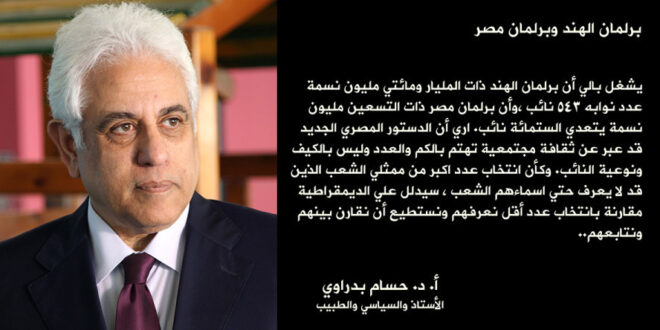I am concerned that India with a population of one billion and 200 million has a parliament of 543 MPs, while Egypt with a population of 90 million has a parliament with more than 600 MPs. Most of us don’t know the candidates and wherever I go people usually ask me who to vote for? We don’t know anyone!
I believe that the new Egyptian constitution reflects a societal culture that cares about quantity rather than quality or the candidate’s background. As if electing the highest number of candidates, most of who are unknown to the people, is an indication of democracy compared to a situation where we can elect a lesser number of people whom we know.
Moreover, unfortunately the same constitution has adopted a governance system which depends on party parliamentarian majority to form a government that is as equal as the president in administering the state taking into account the absence of popular parties for more than 60 years. We all know that Egypt needs sustainable development and stability for the development program to be effective. In my humble opinion and according to my accumulated experience throughout the years, Egypt’s problem was not in the president’s authorities but rather in the mechanism of holding him accountable, the lack of exchanging power, and the imbalance between such power on one hand and the judicial and legislative authorities on the other hand. I pray to God that the new parliament fails my expectations and adds to us instead of taking from us. I hope that the president would rise up to my expectations and involve the civil society in governance and not to resort to unilateral governance under any pretext. I also hope that he would analyze the reasons behind the former political failure and avoid taking the same measures because he would reach the same conclusions. I decided to be positive and to write according to my political, academic, national, and international experience about what I see as achievable hope for Egypt in all domains so that the decision makers would use such experience in what they believe is appropriate. The people elected him to lead and our role is to provide him and the governing institution with the alternatives. They have to choose and we have to hold them collectively accountable.
 Dr. Hossam Badrawi Official Website
Dr. Hossam Badrawi Official Website


